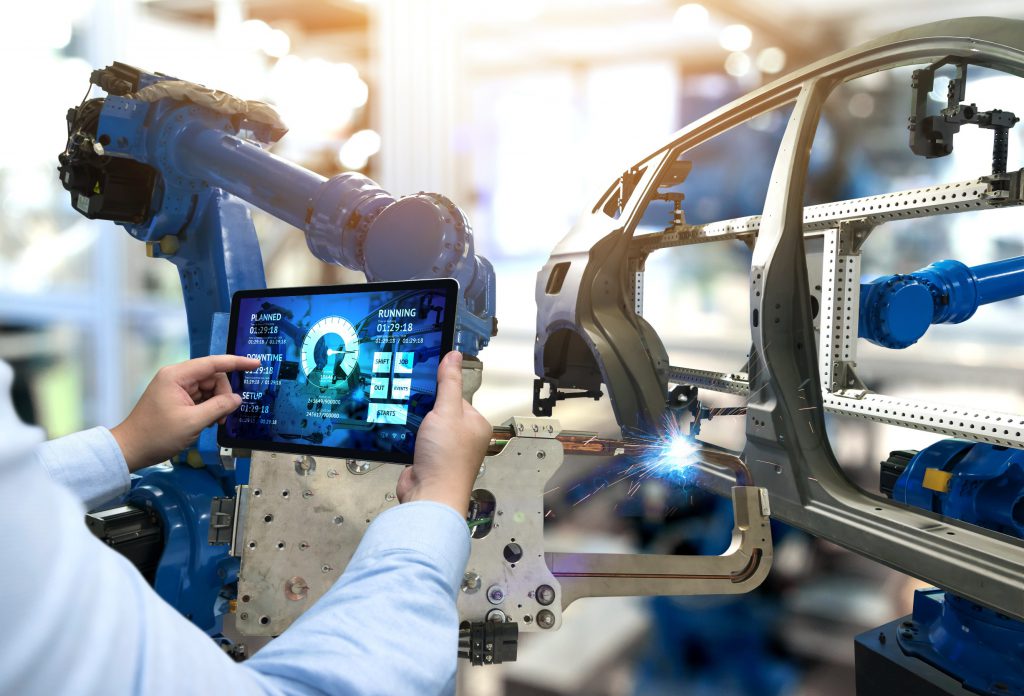FM & BD Technology Technology, Solutions and Innovations
Is South Africa Ready For Industry 4.0?
The idea that we are living in the fourth industrial revolution, or Industry 4.0, is getting a lot of attention. The concept, first coined by the World Economic Forum (WEF), involves the integration of digital systems into the real world.
Smartphones and telematic devices on cars are early examples of this, but within a few years — so the theory goes — we will start living in a world where computers seamlessly serve us around every corner. Advances such as self-driving vehicles and robotic process automation, where robots are taught to do human tasks, are part of this new era.
“The reality is that we are moving into a different form of production than we experienced in the past,” says Teddy Daka, Group CEO of Ansys, a technology company which is developing Internet of Things (IoT) and analytics solutions for mining, transport and other industries.
“Africa for me is one of those areas that should be ready for this,” Daka adds, “Like it or not, things will be different as we get more connected. We run the danger of being disrupted and displaced. On a net basis technology creates more jobs and opportunities, but it can also shift where those are created. That is something we have to be very mindful of.”
Daka cites Netflix as an example: a global company that can reach into various regions with little effort, potentially shifting viewers away from home-grown channels. This is the dangerous power of Industry 4.0: it has global reach and leaves sweeping changes in its wake.
This raises the question: can South Africa take advantage of this movement and create another leapfrog moment similar to what mobile devices did a decade ago?
Bringing it together
Locally we certainly have the technical clout for it, says Kendal Makgamathe, of the Tshimologong Precinct, a startup incubation hub in Johannesburg.
“The muscle memory of South Africa is the expectation that we punch at a high level. If you go back to the sixties and seventies, a lot of technology was created in this country — for a specific ideological reason — but the technology itself was right up there,” Makgamathe says. “That exists and the entire country is now able to tap into that.”
Right up the road from Tshimologong is Wits University, which produces globally recognised technology breakthroughs.
Yet while the passion and expertise is blossoming, a WEF study on Industry 4.0 readiness found that South Africa was a follower rather than a leader in next-generation technologies. We could move into a better position with relative ease, but not without key interventions.
One area is to address the skills shortage, and this is where South Africa could emerge as a leader, says Ansys’s Daka. The country has high, but hidden, levels of functional illiteracy, and while this presents a challenge finding skills for developing Industry 4.0 solutions, it’s a challenge that those same solutions can solve. Daka believes that semi-autonomous trains or mining vehicles, for example, can boost productivity quickly while at the same time providing jobs. “Intelligence in train cabs doesn’t do away with the need for a driver, it just means the driver doesn’t need the same level of skills which we’re struggling to produce,” says Daka.
There is also a chasm between development and production. Local companies in the enterprise space are not taking advantage of opportunities to work with aspiring and inventive young startups. Enterprise development is approached with a social responsibility mindset instead of pursuing real business opportunities, says Shaun Randles, Tshimologong’s enterprise development manager.
“Many corporates pay lip service to startups and incubator alums, and don’t think about the larger value chain play,” Randles says.
“They don’t budget a pipeline for buying from startups, something Americans call ‘portfolio management’. They just check the box.” To this point, Daka also underscored the lack of a venture capitalist market in South Africa.
At least there is momentum in the incubator space. Tshimologong is driving several programmes, supported by companies that are keen to see innovation produce results, galvanising practices such as design thinking.
This concept in part involves creating products based on social contexts — that is: solve real-world problems. Randles notes that many enter the incubator space with a solution that doesn’t have a problem:“We help coach and build the discipline of entrepreneurship, to understand it takes massive discipline and experimentation and frequent iterative change. Some people who come in here are completely raw. So one goal is to create this idea of contextual SA entrepreneurship.”
Continental competition is rising: more and more applicants to Tshimologong are from places such as Nigeria and Kenya. Yet this also holds collaborative promise, says Makgamathe. “There’s a lot more in common between a 25-year-old in Johannesburg and a 25-year-old in Lagos, than between the 25-year-old and a 60-year-old in Lagos, because of digital connectivity.”
But more needs to happen before the leapfrog moment can happen. Another area that concerned the WEF report was lack of clarity around government policy.
Some politicians, such as Gauteng Premier David Makhura, are bullish about pursuing such goals. Late last year, Minister of Trade and Industry Dr Rob Davies also highlighted the need for SA to push innovation at much higher levels.
In his inaugural State of the Nation speech, President Cyril Ramaphosa spoke enthusiastically about setting up conferences and industry bodies. But for all the talk, there has been relatively little action.
“Most of the leading countries such as the UK and others have realised we need a concerted and coherent way of responding to Industry 4.0, because of its disruptive nature. We haven’t done that. We’re still promoting the fossil fuel industry,” says Ansys’s Daka, “We haven’t even come up with advisory councils,” Daka says.
We can be enthusiastic about the continent’s potential, but don’t think it’s inevitable, says Daka: “The African Renaissance narrative is okay. But we need to infuse that narrative with how technology can assist that dream to be achieved.”






 Sign-up and receive the Business Media MAGS newsletter OR SA Mining newsletter straight to your inbox.
Sign-up and receive the Business Media MAGS newsletter OR SA Mining newsletter straight to your inbox.